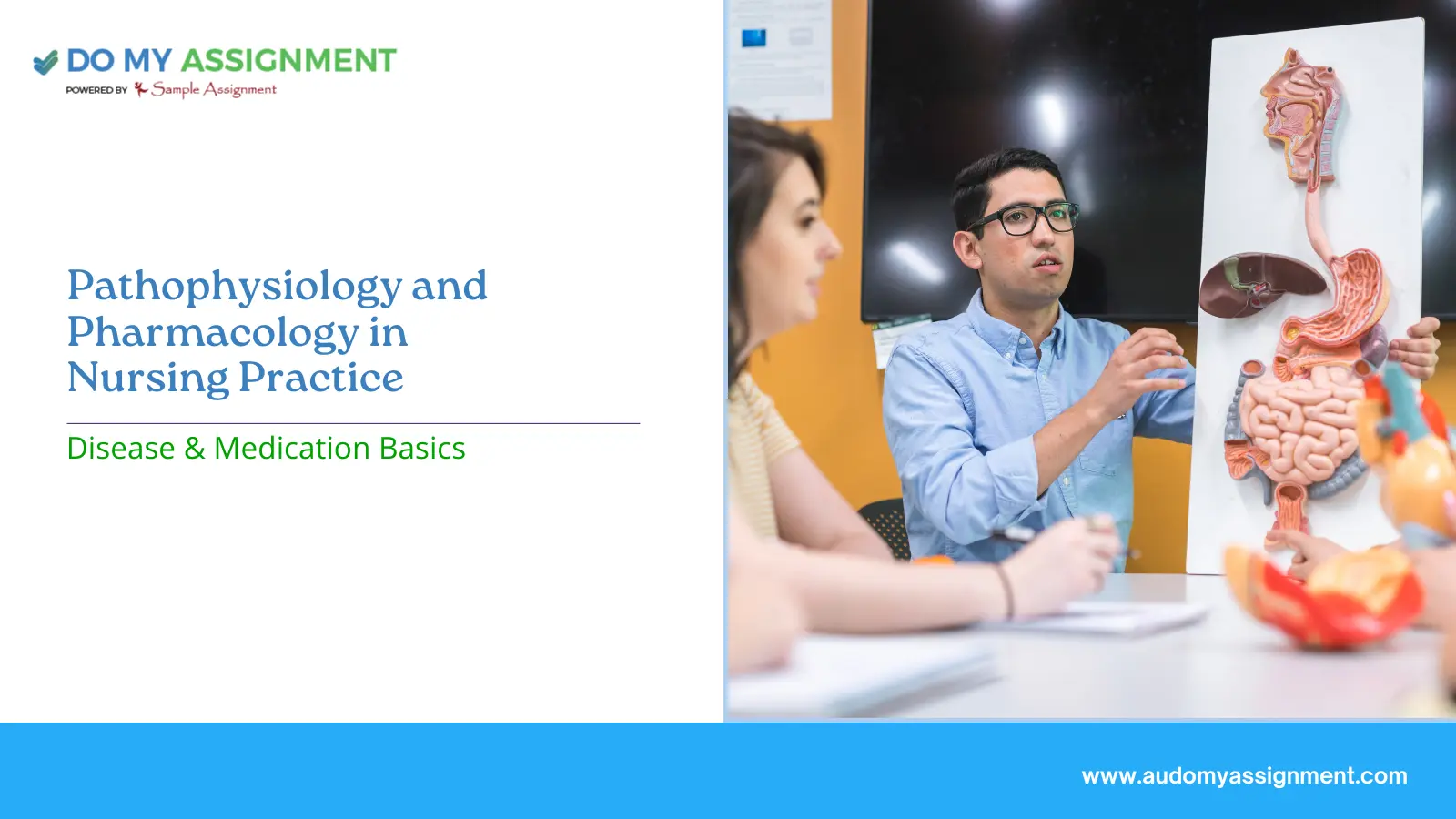Pathophysiology and Pharmacology in Nursing Practice

Highlights
Pathophysiology and pharmacology are two widely used terms associated with nursing and medical sciences. Before diving into the specifics of these terms, it is important to remember that clinical skills are insubstantial if you don’t know the ‘why’ and ‘how’ behind patient care. Pathophysiology and pharmacology are the two terms you need to have a clear understanding of if you wish to explore patient care in a more nuanced and professional manner. In this blog, you will learn about the significance of pathophysiology and pharmacology in nursing practice and how assignments concerned with these topics tend to be. Let us dive into the topic headfirst.
What Is Pathophysiology?
Pathophysiology refers to the study of how diseases affect the processes of the body and the study of disease processes in general. It aims to close the gap between anatomy and physiology, as it seeks to establish what the human body is and how it functions normally. However, the core tenet of pathophysiology lies in the study of changes that occur in the body’s cells, tissues, and organs as a result of diseases or injuries.
What Is Pharmacology?
Pharmacology, on the other hand, refers to the science that studies the effects of drugs on living organisms. You must understand how medications interact with the body and how the body responds to them. Pharmacology helps us to understand why a certain medication is prescribed to treat a certain ailment and why other drugs will be ineffective for said ailment.
What Are Pathophysiology Concepts In Nursing?
Now that we know what the term ‘pathophysiology’ means, let us look at the core components, or concepts that comprise the term. Keep in mind that pathophysiology concepts in nursing are essential if you want to improve your clinical skills and provide better care to the patient. If you need help with your pathophysiology nursing assignments, then feel free to reach out to us.
Homeostasis and Compensation
Nurses need to understand the body’s normal, balanced state (homeostasis). Pathophysiology aims to explain how an injury or illness disrupts this balance and how the body’s compensatory mechanisms try to correct it.
Cellular Injury, Adaptation, and Death
Every disease begins at a cellular level, which is why it is important to understand how cells respond to stress and injury through adaptation. In some cases, cells protect the body from further damage by dying (known as necrosis or apoptosis).
The Inflammatory and Immune Response
This is the body’s first layer of defense against injury and infection. As an aspiring nurse, you must focus deeply on the inflammatory response and its phases, and how the immune system protects the body by neutralizing harmful pathogens.
Altered Fluid, Electrolyte, and Acid-Base Balance
Many diseases, particularly kidney infections or severe vomiting, can disrupt the body’s balance of fluids, electrolytes, and pH levels. It is crucial to understand the underlying pathological causes to identify the signs of imbalance to adequately administer IV fluids or other medications.
Genetic and Neoplastic Disorders
These concepts aim to understand how genetic factors can affect the development of certain diseases in the human body. Understanding such underlying causes can be helpful while prescribing appropriate medications for certain patients and conditions.
What Are Pharmacology Concepts In Nursing?
As we have seen some of the fundamental concepts related to pathophysiology in nursing, it is about time we look at some of the key pharmacology concepts in nursing. Unlike pathophysiology that deals with the effects of harmful pathogens in the human body, these concepts deal with the administering and operations of drugs in our system. Let us look at each of the key concepts in detail.
The Six Rights of Medication Administration
This is the principle of safe pharmacology in nursing that is accepted by nursing professionals everywhere. The six rights include the right patient, the right drug, the right dose, the right route, the right time, and the right documentation.
Pharmacokinetics
Pharmacokinetics deals with the trajectory of the drug after it enters the human body to predict its effects and duration. It can be easily understood with the acronym ADME. It stands for A- absorption, D- distribution, M- metabolism, and E- excretion.
Pharmacodynamics
This concept aims to understand how the drug affects the human body at a cellular or systemic level. As a nurse, you must have a thorough understanding of a drug’s mechanism of action and what potential adverse effects it can cause.
Drug Interactions and Contraindications
A very important part of the nurse’s role is to ensure that different drugs don’t cause a harmful reaction by interacting in the patient’s system. For this, you have to understand how one medication interacts with the other and how its effects interact with each other.
Patient Education
Lastly, it is incredibly important to convince the patient why the prescribed medication is the best for them. Nurses are at the front line of a patient’s interaction with medical professionals, which is why it is your responsibility to inform the patients why a certain drug is appropriate for them.
Why Do Nursing Students Need Help With Pathophysiology and Pharmacology Assignments?
It is not an exaggeration to say that pathophysiology and pharmacology in nursing practice are as important as the brain is to the human body. This is why you need to master the art of writing pathophysiology and pharmacology assignments to further prove your capabilities as a future nurse. Unfortunately, not every student finds these topics easy, which is why they often seek help with writing their assignments. Here are some of the main reasons why nursing students seek assignment help.
The Sheer Complexity of the Concepts
Pathophysiology and pharmacology are highly complex concepts that are very challenging for new students to learn. They deal with the systemic effects of diseases on human cells and, consequently, the entire human body.
The High Stakes of Accuracy
Unlike a literature or mathematics assignment, a mistake in a pharmacology or pathophysiology assignment can actually lead to loss of life in a real-world situation. You have to be absolutely precise in your nursing assignments, down to every last detail.
Time Constraints and Workload
Unsurprisingly, nursing programs are very demanding both physically and mentally. Assignments are tough, and the deadlines are usually not long enough. Plus, students also have to manage assignment writing with studies, clinical practice, and personal commitments.
Why Should You Get Nursing Students’ Assignment Help From Us?
If you happen to be one of the many Australian students who need help with their pathophysiology and pharmacology assignments, then we are here to help. Our nursing assignment help service is designed specifically for students who are struggling with core medical concepts and how to apply them in clinical practice. Here are some of the reasons why you should seek Nursing assignment help for your nursing assignments.
Expert Nursing Professionals
Our nursing assignment help service employs some of the best registered nurses and nursing professors in Australia. They also have years of academic writing experience, so they can write your assignments exactly as your professors demand.
Flawless Accuracy and Clinical Relevance
We provide assignments that do not compromise on accuracy, as they deal with the sensitive issue of saving human lives. Our main focus is also on your assignment’s relevance to your clinical practice and specialization.
Unwavering Commitment to Originality
Most importantly, all of our assignments are written from scratch, ensuring that they are original and authentic. We also provide free plagiarism and AI reports for your assurance.
Comprehensive Subject Coverage
Do My Assignment’s nursing pharmacology help service covers all kinds of nursing subjects, including case studies, drug calculation, care plan assignments, and detailed clinical reports.
Guaranteed Timely Delivery
Also, our service is renowned for its speed and punctuality. No matter how short your deadline is, we will always deliver your nursing assignment on time.
Conclusion
Lastly, it can be said that pathophysiology and pharmacology in nursing practice are vital and non-negotiable. It is incredibly important that you, as a nurse, have a great understanding of what causes diseases in humans and how diseases are countered with immediate medication. If you need help with your nursing assignments, then feel free to contact Do My Assignment Australia. We will help you with anything related to nursing and medicine.
Nick Johnson
Nick is a multi-faceted individual with diverse interests. I love teaching young students through coaching or writing who always gathered praise for a sharp calculative mind. I own a positive outlook towards life and also give motivational speeches for young kids and college students.








